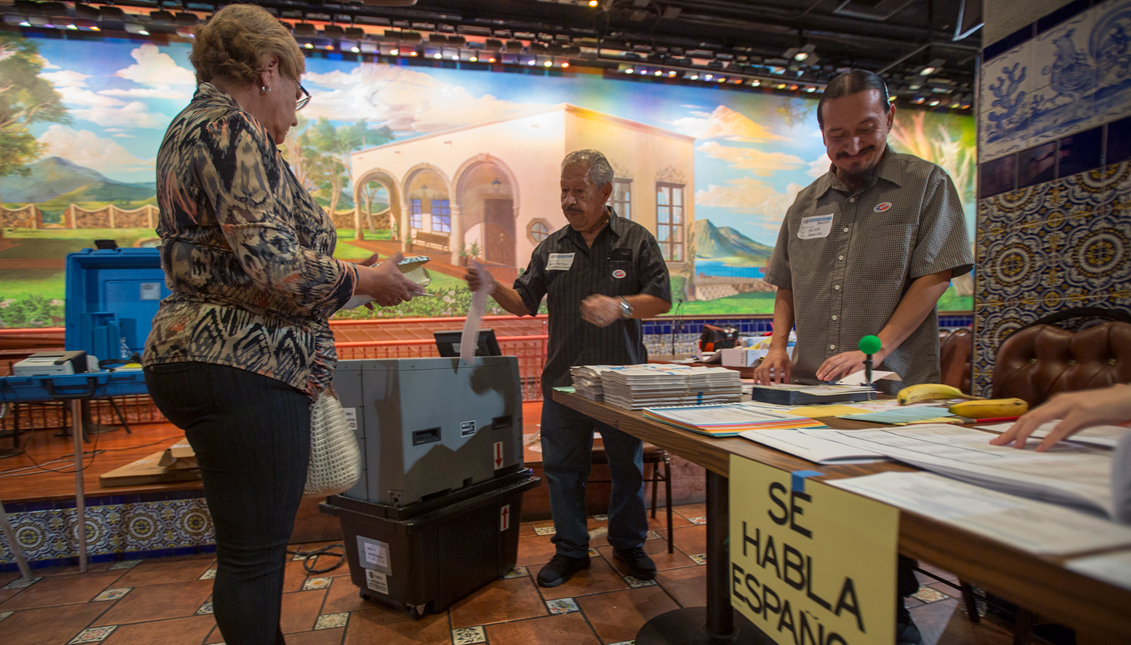
Never a ‘Sleeping Giant’: A look at Latinx mobilization in 2020
We are often called a “sleeping giant” of a voting bloc, but the truth is politicians have been sleeping on us.
Back in March 2020, The New York Times wrote an article on the Latinx vote centered on the premise that we are a voting bloc that has yet to live up to its potential in the electoral process.
This is true to some extent, but there are multiple reasons why the misconception has been formed, made at the expense of a voting bloc that has the capacity to tip the scale.
Latinx voters will have a critical role to play in deciding our next president. But we resent the “sleeping giant” label because that is not what we are at all. The truth is, politicians have been sleeping on us.
If the top leaders in the United States had conversations and conducted outreach within the Latinx community outside of election cycles, perhaps the situation would be different and Latinos would not be as widely regarded to be an easily overlooked demographic.
Politicians too often fall into the trap of dismissing the Latinx community because historically, we are not known to show up to the polls in our fullest capacity. In 2016, less than half of eligible Latinx voters cast a ballot in the 2016 election,
A record number of Latinx voters are eligible to vote in 2020. This has continuously been emphasized despite the 2016 slump.
This year, the Latinx demographic is set to be the largest non-white voting demographic eligible to hit the polls. The emphasis comes amid a year riddled with voter suppression, disproportionate — more than any other demographic — COVID-19 cases and deaths, and the risk of a Census undercount.
Each of these failures, however, has led to never-before-seen engagement and mobilization by Latinos. It is not to say that Latinos are only now just getting engaged, it’s just only now, outlets are paying attention.
Throughout 2020, Hispanic and Latinx voters, organizations, and leaders have proven time and time again that we are engaged in the process. In many cases, we are pioneering voices.
Throughout Trump’s administration, there has been an intensifying animosity between it and its treatment of Latinx lives, seen as early as day one of his campaign trail in 2015.
In 2020, it started with the continued neglect of Puerto Rico following multiple earthquakes.
Still reeling from Hurricanes Maria and Irma, the world watched as his administration continued to treat the island’s inhabitants as second-class citizens. Fast forward eight months — an eternity in 2020 terms— and Puerto Rican star, activist, and icon Bad Bunny lent his hit song “Pero Ya No” to a Spanish-language Biden ad targeting the Latinx vote.
Now we are less than a month before the Presidential election, and nationwide, the Latinx population is caught in a battle of tug-a-war between both presidential candidates. Never before has the Latinx vote been sought to this extent during a Presidential Election, and it comes at a time when the Latinx demographic has been the most let down on multiple fronts.
The coronavirus hit the United States shortly after the Puerto Rican crisis, and it was soon determined that Latinx lives were the most disproportionately affected, in both lives claimed, and those sickened.
Though the Democratic National Convention was found to lack Latinx voices, the voices of the lost were allowed to speak through Kristin Urquiza, who spoke on the impact on Black and Latinx communities, specifically her father, a Trump supporter, who died of the illness.
Since then, Urquiza has been an active mobilizing voice for the Biden campaign.
The nation has never seen Latinx mobilization on this scale within both parties.
RELATED CONTENT
Latinos for Trump, for instance, has become known as an extremely active pro-Trump grassroots organization unaffiliated with the Trump campaign. Trump’s Latinx voter support has always maintained a certain level of strength, despite his disparaging words.
No matter what party affiliation, Latinx voters have been engaged in the conversation and the future of our nation.
Apart from the coronavirus, there was no event in 2020 as poignant as the reignition of the Black Lives Matter movement, unfortunately, sparked by the killing of George Floyd at the hands of police officers in Minneapolis.
Latinx voter advocacy groups like Voto Latino found a new way to protest: increasing voter registration. The organization reported a surge in registrations, an act that could end up being one of the defining factors in tipping the election towards Joe Biden against President Donald Trump on Nov. 3.
The organization is expected to register at least half-a-million young Latinos by Election Day. Similar nonprofits like Mi Familia Vota and Rock the Vote have seen similar trends.
Time and time again, the Latinx demographic has proven it is no sleeping giant leading into Election Day.
However, it is outside factors that could be the real hindrance to the voting bloc’s full potential.
Spanish-language disinformation on the 2020 election is spreading like wildfire in Florida, creating misconceptions at the expense of Joe Biden. Hispanic Caucus members have called for an investigation on the likely outside sources creating and spreading the news, but largely, a lot of the damage so soon before the major election has been done.
Voter suppression in Texas — as well as other states— one of the largest battlegrounds states in the nation, is also a huge problem not only for the Presidential election but also for local elections down the ballot.
But hindrances like these have always been there for Latinx voters.
Thirty two-million eligible voters is a record number never before seen for Latinos, and this year has seen unprecedented mobilization efforts. This feels like there is potential for something big.
We’re here, we’re waiting, and we’re wide awake.










LEAVE A COMMENT: